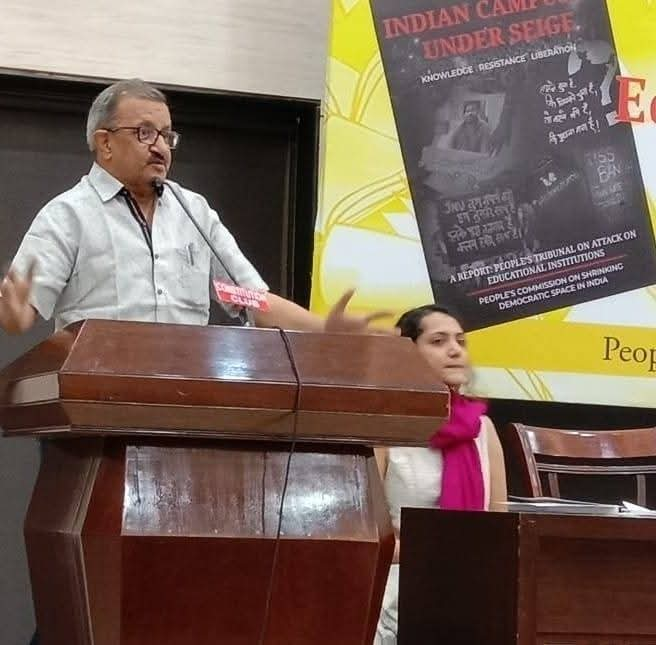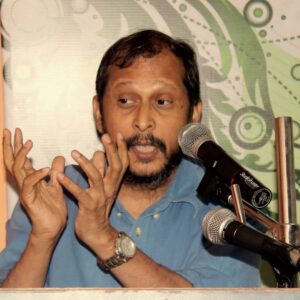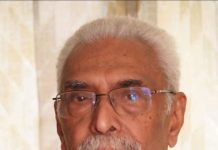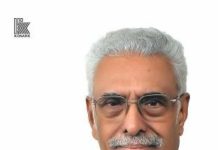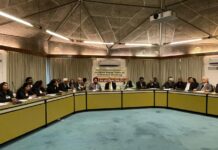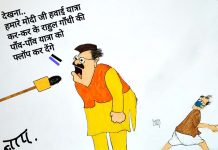— Nalin Ranjan Mohanty —
It was a poignant moment last evening when many of us who knew Anil Chaudhury for more than four decades bade him final good bye at Nigambodh Ghat. Among those who were present to watch his body consigned to flames were friends, family, relatives, and many grassroots activists whom Anil had mentored over the years.
When I joined the JNU campus, Anil was a visible face as a SFI leader; in fact, he went on to become the General Secretary of the JNU Students’ Union, with Sitaram Yechury as President. Like Sitaram, Anil was very affable and approachable. Over a period of time, I joined a rival political platform in student politics, but that didn’t sour our relationship. Those were the days when the JNU campus was a students’ paradise where political rivalry could subsist with respect to each other as fellow activists. We fought with words, not swords, as is the unfortunate case today.
But, as it is. university life was a transitory phase; we moved out of the campus and went in different directions. I became a journalist and Anil joined PRIA, set up by Dr Rajesh Tandon, which was making waves those days as a pioneering experiment in participatory research and inclusive development.
Over the years, there were two sharp breaks in Anil’s professional life: from both PRIA and from the CPM. He moved on to become a left-leaning social activist who mobilised and brought together grassroots movements on a joint platform. Anil’s relentless efforts led to the creation of PEACE, Popular Education and Action Centre.
Anil was deeply disturbed by the communal conflagration surrounding the Babri masjid controversy and was instrumental in the creation of INSAF for fostering communal harmony.
As a matter of fact, both PEACE and INSAF became Anil’s fulcrum of life in the last three decades. Many community activists working in the remotest parts of the country looked up to him for support and guidance. Anil extensively travelled all over India to inspire youngsters to dedicate themselves to a common cause.
During my stint in Patna as a journalist, I met Anil a few times when he came to address the grassroots activists. I had done a few interviews with him. When, later, I was associated with a media institute in Noida, I always made it a point to invite progressive activists and inspirational leaders to come and share their thoughts. Anil had come twice, addressing two different batches of students. His presentations were thought-provoking. He brought home the point that students of communication could look forward to a career beyond the legacy media houses, which are in anyway shrinking, and explore opportunities in the social sector where they can directly contribute to the uplift of the marginalised sections.
Anil personified an inclusive existence. There were no barriers, barricades in interpersonal relationship. He would happily take a beedi from a security guard to smoke; he would unhesitatingly share a plate of food with unknown people. He was made of a different stuff. But, clearly, in all his passion for ushering in a more inclusive society, Anil did not pay much attention to his health. He was diagnosed with cancer about five years ago. It has been a valiant struggle since then; Ranjana, Anil’s love since JNU days, stood like a rock behind him, despite her own preoccupation as a professor of Russian studies in Delhi University.
Last week, Anil was admitted to Fortis hospital in Gurgaon for treatment of some complications. There he suffered a massive heart attack and went into a coma. Thus came to an end the riveting life of a friend who fought all his life to bring joy to the lives of millions of underprivileged people. Anil’s passing away is a terrible loss for thousands of activists all over the country associated with PEACE.
I will personally miss Anil’s encouraging words from time to time, after many of my FB posts he liked or shared all these years.
Anil used to say: Comrade, we need to hang together to weather a crisis, a developmental and communal crisis. That was his distilled wisdom of a lifetime dedicated to a public cause.
If we continue to work together to create a more equitable world, I would think, that would be the best tribute to Comrade Anil Chaudhury.
Discover more from समता मार्ग
Subscribe to get the latest posts sent to your email.

